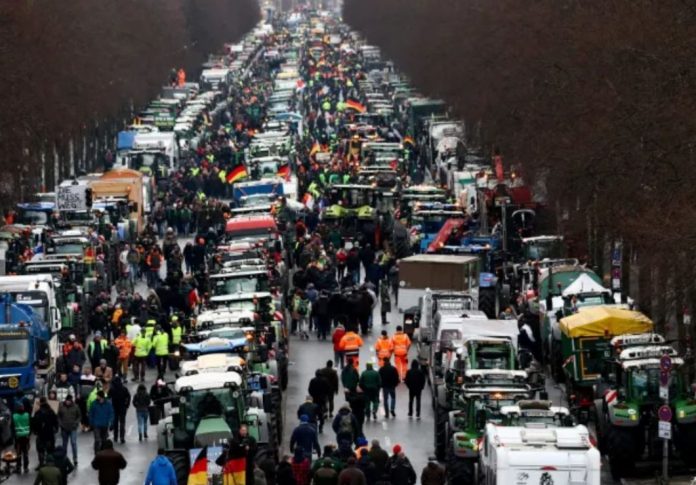News in brief:
â German farmers and workers protest in Berlin against Chancellor Olaf Scholzâs plan to eliminate tax breaks on diesel fuel cause significant traffic disruptions.
â Despite backtracking partially and retaining tax exemptions for farm vehicles, many protesters find these concessions inadequate and warn of potential dire consequences for the agricultural sector.
Thousands of German farmers, truck drivers, and agricultural workers stormed central Berlin in a historic protest against Chancellor Olaf Scholzâs plan to phase out tax breaks on diesel fuel. The demonstration, culminating a week of nationwide disruptions, saw tractors and heavy machinery clogging key traffic arteries around the iconic Brandenburg Gate. It led to major public transit delays.
Police estimated an initial surge of 3,000 tractors, with another 2,000 expected to join the rally. Over 10,000 individuals registered for the protest, but the throng likely surpassed initial projections. To maintain order, Berlin deployed 1,300 police officers, according to Police Chief Barbara Slowik speaking to news reporters.
The core of the discontent lies in the governmentâs proposed elimination of diesel subsidies and tax breaks. This decision was triggered by a court ruling and budget constraints. It sparked outrage among farmers, who perceive the move as a threat to their livelihoods.
Finance Minister Christian Lindner faced the agitated crowd, attempting to assure them that the government empathizes with their plight.
However, his pledge for more freedom and respect fell on deaf ears and was met with jeers of liar as well as demands for new elections. Reporters on ground say that the farmersâ believed in widespread public support despite the gridlock they caused.
Meantime, the protest marks the culmination of a week of escalating unrest. Disgruntled farmers previously blocked highway entrances and slowed down traffic across the country, dissatisfied with the governmentâs initial proposed concessions.
Additionally, in a bid to appease the protesters, the government partially backtracked on its plans, retaining the tax exemption for farm vehicles and phasing in diesel tax cuts over three years. Chancellor Scholz defended the compromise, stating that he took the farmersâ arguments to heart.
However, for many farmers, backed by opposition parties and the far-right, these concessions remain insufficient. Some protesting farmers have warned of dire consequences if subsidies are not reinstated. They claim it would lead to farm closures and increased reliance on imported food.



